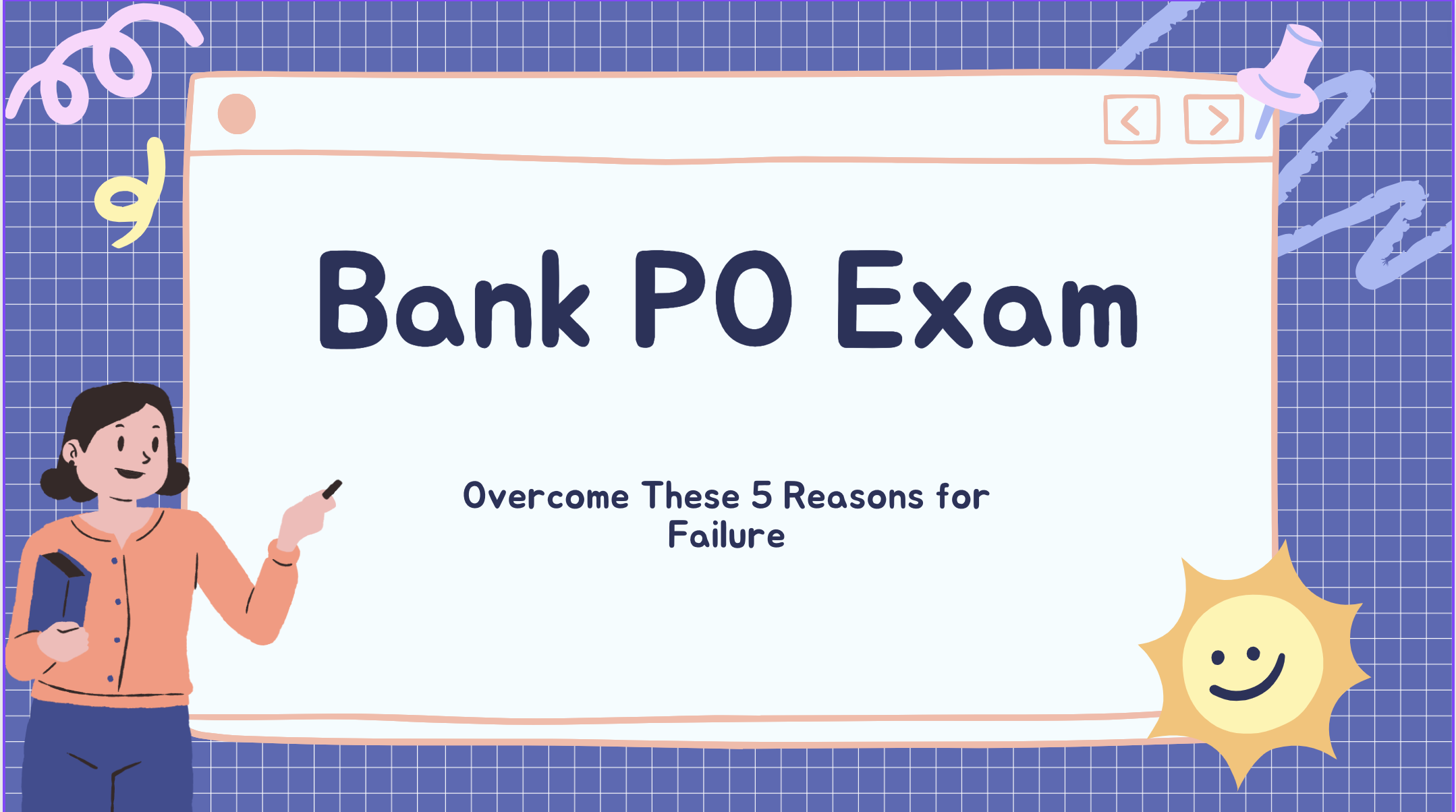
Bank PO Exam – Overcome These 5 Reasons for Failure
Bank PO Exam 2024: The IBPS PO Exam, conducted annually by the Institute of Banking Personnel Selection, poses a significant challenge for aspiring candidates. With a multitude of participants each year, only a select few manage to succeed, while many others experience repeated failures. As one of the most fiercely competitive exams for the recruitment of Probationary Officers (PO) in various banks nationwide, cracking the IBPS PO exam is no easy feat. The success rate in this exam is considerably lower than the failure rate, and with each passing year, the number of candidates and the rate of failure continue to rise.
The exam’s competitiveness is such that even with rigorous preparation and hard work, many candidates fall short of qualifying. While some manage to clear the written exam, they struggle to meet expectations during the interview round. Consequently, even if they pass the written examination based on merit, they fail to secure the final selection as a Bank PO. Numerous factors contribute to the failure of candidates in the IBPS PO examination. In this article, we will explore some of these reasons and endeavor to address the question on everyone’s mind: “How challenging is the IBPS PO exam?”
5 Reasons for failing the Bank PO exam –
1. Insufficient familiarity with the syllabus:
A critical mistake many candidates make is embarking on their preparation without thoroughly reviewing the exam syllabus. Instead, they attempt to cover every type of question they come across. This approach overlooks the fact that the pattern and syllabus undergo changes annually. By acquainting themselves with the syllabus, candidates can avoid dedicating time to less important topics that hold no weightage over the years. To achieve success, it is crucial to identify and exclude “THE TOPICS TO AVOID WHILE PREPARING.”
2. Neglecting previous year’s exam papers and cut-offs:
By reviewing previous year’s papers, candidates gain valuable insight into the types of questions asked in the actual exam. Solving these papers gives them an advantage over candidates who have not attempted any of them. Going through at least 5-6 previous year question papers is advisable. Additionally, analysing the trends in previous year cut-offs empowers candidates to make better decisions when attempting questions in the actual exam.
3. Underestimating the level of competition
Some candidates approach the bank examination with a lackadaisical attitude, a primary reason for their failure. The number of aspirants applying for posts with thousands of vacancies leads to intense competition. Given the low success rate, selection primarily hinges on performance and sectional cut-offs. It is essential to give your best to secure a position in this exam.
4. Engaging in blind attempts to increase the number of responses
During the exam, candidates sometimes feel compelled to answer questions by guessing, believing they have not attempted enough to meet the cut-off. However, the IBPS PO exam imposes a penalty of 0.25 for each incorrect response. Guesswork significantly diminishes the chances of being selected. Avoid guessing answers unless you are entirely certain.
5. Struggling with exam anxiety:
Succumbing to exam anxiety is a critical mistake that anyone can make. The IBPS PO exam has sectional timing, which increases the pressure to solve all questions within the designated time frame. This anxiety often leads to marking incorrect answers. First-time candidates are particularly prone to exam hall anxiety. To mitigate this, it is advisable to practice mock tests extensively. Solving mock tests instills confidence when facing questions in the actual exam.
Now, let us address the question: “How challenging is the IBPS PO exam?”
The preliminary level of the IBPS PO exam is primarily a qualifying stage, where candidates need to meet the overall and sectional cut-offs to progress to the mains. The overall cut-off depends on factors such as the number of candidates, available seats, and exam difficulty. The prelims exam is relatively manageable to clear, especially when practicing mock tests to familiarize oneself with the exam.
With proper preparation spanning approximately 4-5 months, it is feasible to pass the exam, assuming candidates possess a basic understanding of quantitative aptitude, English language, and reasoning. While some candidates hold the notion that they can qualify within 3-4 attempts, it is important to recognize that many succeed on their first try. Clearing the exam in the initial attempt requires dedicated practice and consistent effort.
When evaluating the difficulty level of the IBPS PO exam, it is evident that the exam and the questions themselves are not inherently tough. The IBPS PO exam comprises fundamental questions in quantitative aptitude, English language, and reasoning. However, the large number of seats available juxtaposed with the considerable number of candidates vying for them intensifies the overall challenge of the exam.
In conclusion, the IBPS PO exam is not inherently difficult to clear if candidates adopt a proper strategy and avoid the aforementioned mistakes.
IBPS Bank PO Exam Pattern:
Here is the IBPS PO Prelims exam pattern:
| Name of Tests | No. of Questions | Maximum Marks | Duration |
| English Language | 30 | 30 | 20 minutes |
| Numerical Ability | 35 | 35 | 20 minutes |
| Reasoning Ability | 35 | 35 | 20 minutes |
| Total | 100 | 100 | 60 minutes |
Here is the IBPS PO Mains exam pattern:
| Name of test | No. of Questions | Max. Marks | Medium of Examination | Time Allotted |
| Reasoning and Computer Aptitude | 45 | 60 | English and Hindi | 60 minutes |
| English Language | 35 | 40 | English only | 40 minutes |
| Data Analysis and Interpretation | 35 | 60 | English and Hindi | 45 minutes |
| General, Economy/Banking Awareness | 40 | 40 | English and Hindi | 35 minutes |
| Total | 155 | 200 | 180 minutes | |
| English Language (Letter and Essay writing) | 2 | 25 | English | 30 minutes |
Tips and Strategies to Excel in the IBPS Bank PO Exam
To clear the IBPS PO Exam successfully, consider implementing the following tips and strategies:
- Create a Well-Structured Study Plan: A common mistake many aspirants make is a lack of systematic studying. To ensure a methodical approach, develop a comprehensive study plan that covers all the topics included in the exam.
- Choose Reliable Study Materials: With numerous books available in the market, selecting reliable and reputable sources is crucialness. Focus on standard books that provide accurate and relevant content. If you have notes from a coaching institute, refer to them for additional guidance.
- Emphasize Practice: Top performers’ commitment to extensive practice is one distinguishing factor. Practice plays a pivotal role in this exam, so dedicate ample time to solving practice questions to enhance your skills and familiarity with the exam format.
- Engage in Mock Tests: Enrol in a mock test series to better understand the actual exam level and structure. Mock tests simulate the exam environment, allowing you to assess your performance, identify weaknesses, and refine your exam-taking strategy.
- Analyse Previous Year Question Papers: Reviewing the previous year’s question papers offers valuable insights into the exam’s difficulty level and the types of questions asked. Familiarize yourself with the question patterns and prioritize topics accordingly in your preparation.
We hope these tips and strategies assist you in your IBPS PO exam preparation. Best of luck!
Further readings –
NEET 2023 Answer Key Release by NTA; Here’s How to Download
Rajasthan RBSE 10th Result 2023: Link Activated
